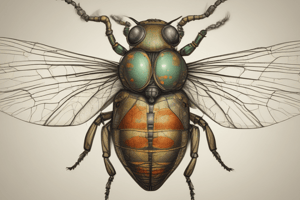Podcast
Questions and Answers
What major function do Malpighian tubules serve in insects?
What major function do Malpighian tubules serve in insects?
- Storage of excess water
- Production of energy through metabolism
- Absorption of nutrients from the digestive tract
- Excretion of metabolic wastes and toxins (correct)
How does the excretory system contribute to homeostasis in response to excess nitrogen metabolites?
How does the excretory system contribute to homeostasis in response to excess nitrogen metabolites?
- By reducing the rate of water absorption
- By increasing the absorption of nutrients
- By enhancing metabolic processes
- By actively secreting nitrogen waste into the Malpighian tubules (correct)
What initiates the increased fluid secretion in the excretory system during homeostatic imbalance?
What initiates the increased fluid secretion in the excretory system during homeostatic imbalance?
- Activation of digestive enzymes
- Decreased osmotic pressure
- Increase in cation levels
- Release of chloride transport stimulating hormone (correct)
What osmotic condition may result from reabsorption in the rectum during excess water intake?
What osmotic condition may result from reabsorption in the rectum during excess water intake?
Which of the following ions is primarily reabsorbed by the electrogenic Cl− pump in the rectum?
Which of the following ions is primarily reabsorbed by the electrogenic Cl− pump in the rectum?
What happens to excessive water intake from plant sap in relation to the excretory system's function?
What happens to excessive water intake from plant sap in relation to the excretory system's function?
Which of the following best describes the role of neuropeptide hormones in the rectum's reabsorption processes?
Which of the following best describes the role of neuropeptide hormones in the rectum's reabsorption processes?
In which way do changes in environmental conditions affect the excretory system's function?
In which way do changes in environmental conditions affect the excretory system's function?
What impact does the reabsorption of K+ have on the rectum's activity?
What impact does the reabsorption of K+ have on the rectum's activity?
Flashcards are hidden until you start studying
Study Notes
Excretory Processes in Insects
- Insects utilize both the Malpighian tubules and hindgut for excretion, with their combined function as excretory organs.
- The Malpighian tubules filter hemolymph to form primary urine, which is then processed in the hindgut.
- Excreta consist of undigested food, bacterial-modified substances, and urinary waste from the tubules.
Malpighian Tubules
- Structures can number from 2 to over 100 depending on the species.
- They are located at the junction of the mid- and hindgut, ending in the hemocoel, and have numerous tracheal connections for oxygen supply.
- Functions extend beyond excretion; they include detoxification, metabolic roles, and supporting immune responses.
- Known genomes from species like Drosophila melanogaster provide opportunities for studying human genes.
Primary Urine Formation
- Primary urine is a hemolymph filtrate containing small ions, sugars, and amino acids.
- Formation relies on a proton pump, vital across various eukaryotic cells, affecting multiple insect organs.
- Proton pumping creates a positive lumen charge, enhancing the exchange of K+ for H+ via antiporter mechanisms.
Hindgut Functionality
- The hindgut selectively reabsorbs substances, leaving waste and actively secreting materials into the lumen.
- Small cell groups such as rectal cells play significant roles in this process, especially in the rectum.
- The ileum regulates acid-base balance by secreting H+ and forming NH4+, while reabsorbing bicarbonate ions.
Rectal Absorption
- The rectum is crucial for reabsorbing ions, water, and nutrients, producing concentrated excreta.
- Absorption relies on an electrogenic Cl− pump influenced by neuropeptide hormones, facilitating active chloride absorption and K+ reabsorption.
Homeostasis and Excretion
- Homeostasis involves maintaining internal environmental stability in organisms; the excretory system aids in removing metabolic wastes and toxins.
- Excretory processes adapt to variations in salt, water, acid-base levels, and nitrogen metabolism influenced by food intake and environmental changes.
- Excess water and nutrients from plant sap ingestion necessitate efficient waste disposal through the excretory system.
Studying That Suits You
Use AI to generate personalized quizzes and flashcards to suit your learning preferences.




